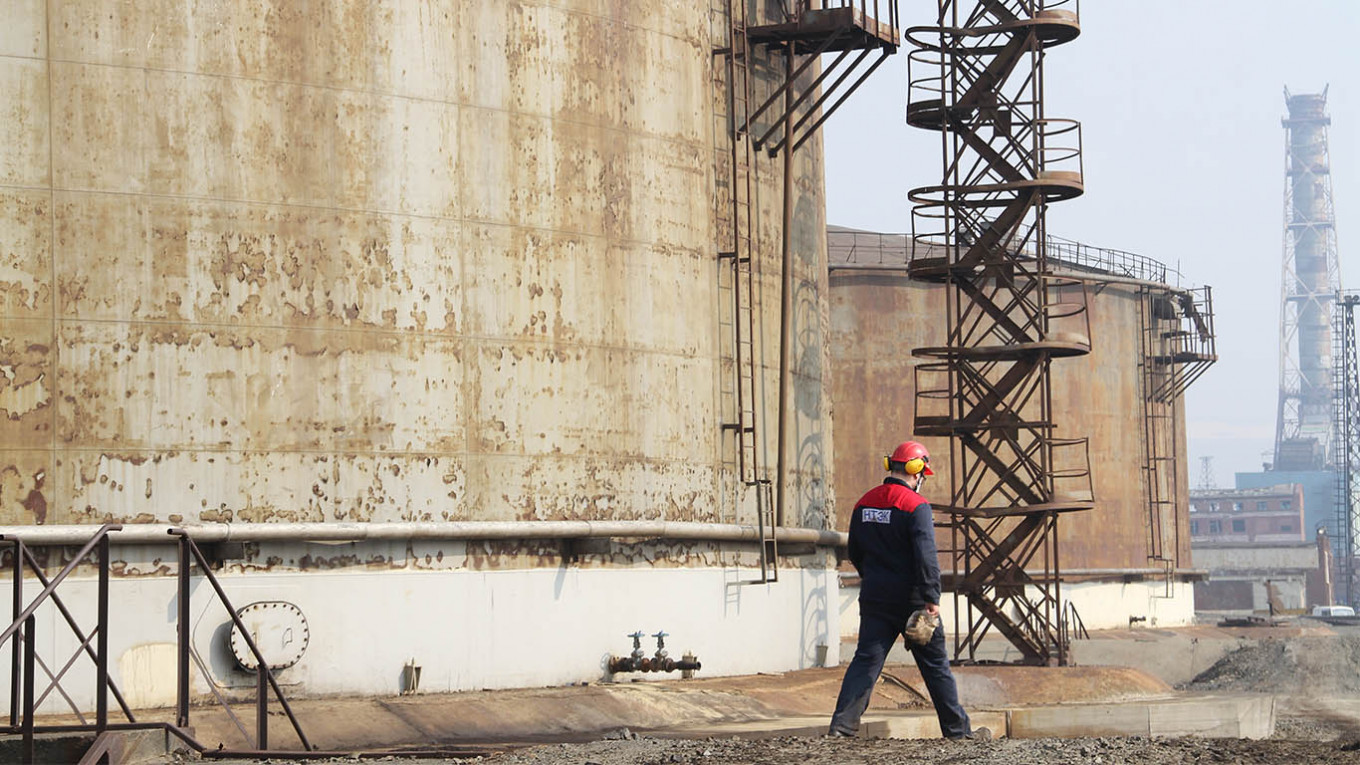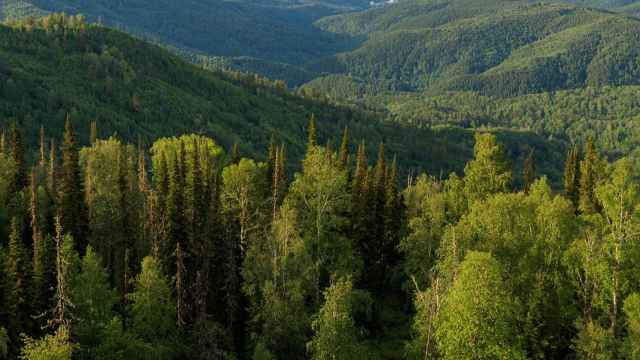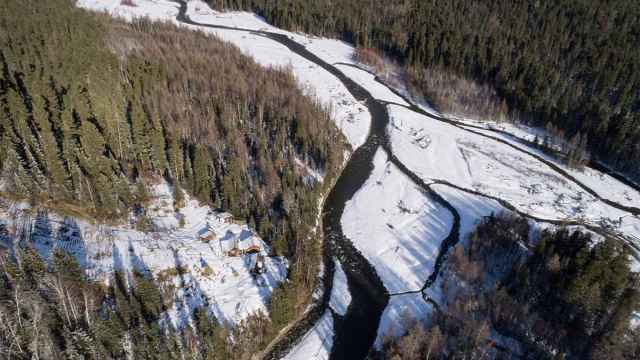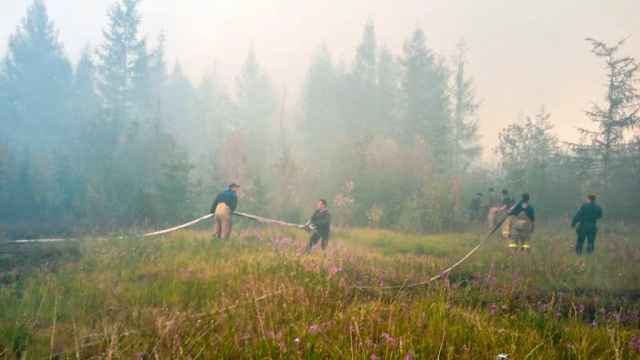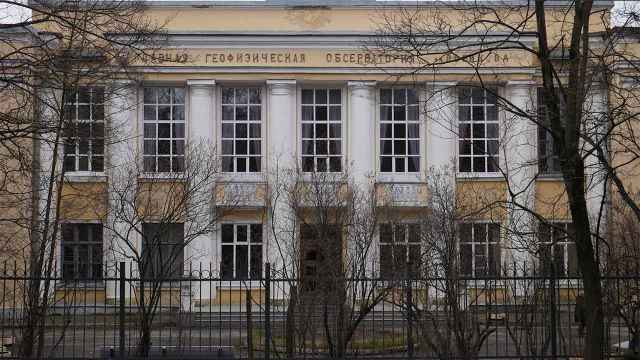Over the past year, Siberia has seen disaster on a biblical scale.
Last spring, forest fires enveloped an area larger than Greece, causing $100 million in damage. In what Greenpeace called a “climate catastrophe,” the fires emitted more carbon dioxide in June alone than Sweden does in an entire year.
Then, as those fires were raging, a cyclone struck the Irkutsk region, triggering what scientists said were the worst floods in the area in 180 years.
Now, melting permafrost is believed to have caused one of the worst oil spills in Arctic history, after a diesel fuel reservoir at a power plant outside the Krasnoyarsk region city of Norilsk collapsed last Friday, turning a nearby river burnt red.
“Of course we still need to do a full inspection — and I am demanding that foreign investigators be brought in as well — but it appears that melting permafrost caused this tragedy,” Sergei Shakhmatov, former deputy ecological minister for Krasnoyarsk and director of Russia’s Greens Party, told The Moscow Times by phone after touring the site of the spill Thursday.
“This tragedy is serious,” he added. “I have never seen something of this scale before.”
On Thursday, Russia’s environmental watchdog said 15,000 metric tons of diesel fuel were released into the Ambarnaya River and 6,000 into the surrounding soil. The size of the disaster has been compared to the Exxon Valdez oil spill in 1989, when 37,000 metric tons of oil leaked off the coast of Alaska.
The Investigative Committee has since opened three investigations into environmental pollution and violations of safety rules.
But while experts say negligence is certainly at play, they emphasize that climate change is a major factor — and that it is high time for the authorities to begin taking adaptation measures seriously.
“We’ve known what is happening for a long time — and knowing this, we need to conduct a review so we can better understand all of the risks for our infrastructure,” said Mikhail Yulkin, Director of the Center for Environmental Investment.
As the world’s temperatures warm, Siberia is heating up at a much faster rate than the rest of the planet. That is causing the permafrost — what up until recently was permanently frozen packed ice and dirt — to melt.
For Russia, the phenomenon poses a grave risk: much of the infrastructure for extracting the resources that drive the country’s economy sits atop the permafrost that covers two-thirds of the country. In a study published last year, researchers found that the value of buildings and infrastructure on Russian permafrost amounts to $300 billion.
“People don’t comprehend the scale of this change, and our government is not even thinking about it,” Alexander Fedorov, deputy director of the Melnikov Permafrost Institute, told The New York Times last year.
Yet not only has the process been going on for a long time, Yulkin noted that Russian authorities have long been aware of it.
“Photos of crumbling buildings in places like Norilsk are no longer a novelty,” he said.
Yulkin, who advises resource-rich regions like Siberia’s Khanty-Mansiysk autonomous district on how to adapt to melting permafrost, pointed to a 2017 report published by Russia’s state weather and environment service Roshydromet on the country’s climate risks — much of which was dedicated to melting permafrost.
In retrospect, one line about the site of the recent oil spill disaster sticks out.
“In Norilsk, the number of buildings damaged over the last 10 years turned out to be higher than over the previous 50 years,” the report reads.
After last week’s spill, the Russian mining conglomerate Norilsk Nickel, which owns the fuel reservoir, said the tank was damaged when its supporting pillars began to sink.
While the company said that the pillars had “held it in place for 30 years without difficulty,” its Chief Operating Officer Sergei Dyachenko acknowledged that melting permafrost was likely at play.
“We believe that something happened in the ground,” he said Thursday. “Perhaps it was thawing.”
The process is furthered by the increasingly warm temperatures in the Arctic.
After the warmest winter on record, a heat wave across Siberia starting in April and continuing through May even saw one northern town see temperatures hotter than Barcelona on May 22, shattering its own record for that day by 13 degrees Celsius.
As of late May, weather experts said temperatures in the region have been between 3 degrees Celsius and 6 degrees Celsius above average since January, and have ignited forest fires that already cover an area the size of Greece once again.
And as those hotter temperatures warm the carbon-rich permafrost, it releases more greenhouse gases into the atmosphere and speeds up climate change, said Vasily Yablokov, head of Greenpeace Russia’s climate change division.
“This is a threat to our infrastructure and it is happening very intensively,” he said. “But Russia is unfortunately not doing enough in this battle.”
If there is to be any silver lining from the oil spill, which could take years to clean up and has been estimated as having caused nearly $80 million in damage so far, Yulkin hopes it will be the wakeup call Russian authorities need.
“In Russia, until it actually rains a man will not cross himself,” he said. “But the thunder is now so loud it’s impossible not to hear it.”
A Message from The Moscow Times:
Dear readers,
We are facing unprecedented challenges. Russia's Prosecutor General's Office has designated The Moscow Times as an "undesirable" organization, criminalizing our work and putting our staff at risk of prosecution. This follows our earlier unjust labeling as a "foreign agent."
These actions are direct attempts to silence independent journalism in Russia. The authorities claim our work "discredits the decisions of the Russian leadership." We see things differently: we strive to provide accurate, unbiased reporting on Russia.
We, the journalists of The Moscow Times, refuse to be silenced. But to continue our work, we need your help.
Your support, no matter how small, makes a world of difference. If you can, please support us monthly starting from just $2. It's quick to set up, and every contribution makes a significant impact.
By supporting The Moscow Times, you're defending open, independent journalism in the face of repression. Thank you for standing with us.
Remind me later.



